The Ozark Play-Party by Vance Randolph
The Journal of American Folklore, Vol. 42, No. 165 (Jul. - Sep., 1929), pp. 201-232
THE OZARK PLAY-PARTY
BY VANCE RANDOLPH
The early settlers in the Ozark Mountain region of Missouri and Arkansas had few social pleasures, and one of the most important was the play-party, a gathering at which young people of both sexes played party-games. Most of the old-timers thought that dancing was immoral, and regarded the fiddle as the devil's own instrument. Less than a dozen years ago the people of my own village refused to allow a children's dancing-class in the town, and I myself heard one of our leading citizens declare that he would rather see his daughter dead than to have her dance, even in her own home. But the play-party, it appears, is a different matter altogether, and even the most fanatical religionists see no particular harm in it. The party-games are really dances, of course, but there is no orchestra; the players furnish their own simple music by singing lustily as they go through the intricate figures, while the spectators clap their hands and stamp their feet as the spirit moves them.
The typical Ozark play-party is not arranged for any particular number of guests, and no special invitation is necessary; the news is simply "norated 'round" that there is to be a frolic over at so-and-so's place, and anybody is welcome who cares to attend. Most of the parties at which I have disported myself drew people from a distance of five or six miles, which is a long ride over the rough mountain trails. Shortly after dark the guests begin to arrive; young people usually travelling on horseback or afoot, while the old folks come in wagons, or occasionally in Ford cars. The girls generally make some effort to "dress up" for these affairs, but many of the young men are attired simply in heavy boots, hickory shirts, and overalls - which latter garments, for some reason or other, are known as "duckins."
The women usually go into the house immediately upon their arrival, but the cabins are too small to hold all the guests, so the men-folks wait their turns outside, where they stand about peering in at the doors and windows. At some play-parties no food is served, but often the dancers are regaled with watermelons or apples, and sometimes there is a plate of sandwiches, or cold meat of some sort. The Ozark women do not drink in public, but the young men usually have a jug of whiskey out in the dark where the horses are tied, and drinks are free to anybody who wants them. There is a certain amount of clandestine love-making - which the hillman elegantly designates as "tom-cattin"' - and occasionally a party breaks up at dawn in a drunken riot, but on the whole I think there is less drunkenness and sexual irregularity than at most college dances.
Nowadays, when a man "swings his partner" he puts his arm around her waist in something approximating the ordinary ballroom position, but the old folks tell me that this was never done in their "day an' time." The proper thing then was to "swing" with all four hands held high, palms together. Sometimes, as one old man told me with a reminiscent twinkle, a very daring girl would pretend that she was about to permit the waist swing by holding out her right arm, but she always laughed and pulled her elbow down before the boy could put his arm around her.
The games usually commence inside the cabin, but if the weather is fine the whole party often moves out to the cleared space in front of the house, so that most of the games are played by moonlight, or in the dim light which flickers out from the open door and windows. In the summer time, particularly, the date of a party is usually fixed with due reference to the almanac, so that the "doin's" may fall on a moonlight night.
Although I have read some books and papers about the party-games as played elsewhere, and have referred briefly to this literature in connection with each individual game, my reading has not altogether satisfied my thirst for information about the Ozark play-parties. Such questions as the age and origin of the games, the changes which they have undergone in their successive migrations, the forces which have brought about these modifications, their obvious connection with balladry, their relation to the square dances and to modern school-children's games - all these are matters of which I still know very little. I do know the songs and games as they are sung and played in the Ozarks, however, and it is this information that I shall try to record here, leaving all theoretical and scholarly considerations to specialists in these matters.
Most of the songs presented in this paper were collected in southwestern Missouri, in McDonald, Barry, Taney and Stone counties; a few items came from Benton, Carroll, Washington and Boone counties in northwestern Arkansas. It is impossible to acknowledge specifically the assistance received from many sources, but a special word of appreciation is due Mrs. Helen Chambliss and Mrs. Noah Chapman, of Anderson, Missouri, who have helped me in recording the melodies. Mrs. Marie Wilbur, Pineville, Missouri, Mr. Allen Woods, Pack, Missouri, and Dr. A. H. Pootford, formerly of Fayetteville, Arkansas, have also given generously of their time and energy in the collection of material.
1. SKIP TO MY LOU
This is probably the most popular of all the play-party games, and was formerly well known in all parts of the United States. Gardner (JAFL 33: 123-126) gives seven "Skip Come a Lou" songs from Michigan. Hofer (Popular Folk-Games, 1907, p. 12) reports a similar song called "Skip-to-ma-Lou, my Children Dear" and says that the game is still played in the Southern States. Perrow (JAFL 26: 136) remarks that "lou is a common term for sweetheart in Eastern Tennessee." Sinclair Lewis (Our Mr. Wrenn, 1914, p. 182) spells it "Skip to Malue," while Owen Wister (When West was West, 1928) named one of his stories "Skip to my Lou." Blair (JAFL 40: 98) gives several odd stanzas, and Richardson (American Mountain Songs, 1927, p. 82) has a very good Southern variant. Belden (Song-Ballads and Other Popular Poetry, 191o, No. 145) quotes a song called "The Miller" which contains some "Skip to my Lou" lines. Ames (JAFL 24: 304) reports fugitive lines from this song in several other party-games. See also Wedgwood (JAFL 25: 270). Van Doren (JAFL 32:493) and Piper (JAFL 28: 276). The stanzas below were recorded from the singing of Mr. Carl Durbin, Pineville, Missouri. After choosing partners, all the players join hands and form a large circle, while everybody sings:
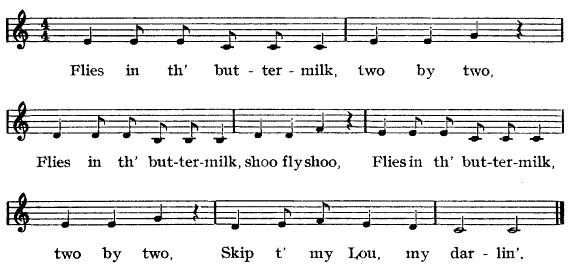
While this is being sung, one couple steps into the ring and chooses another boy, so that there are two men and one girl in the center, who hold hands and dance about the circle with a peculiar skip and doubleshuffle step. The first boy and girl hold their hands high, the odd boy steps under the arch thus formed, and the first couple joins the circle again. The boy left alone in the ring calls in another couple, then he and the girl make the arch and join the circle, leaving the new boy alone in the center. Then he chooses another couple, and so oin. Meanwhile the song goes on:
Little red wagon, painted blue,
Little red wagon, painted blue.
Little red wagon, painted blue,
Skip t' my Lou, my darlin'.
Dad's ol' hat got tore in two,
Dad's ol' hat got tore in two,
Dad's ol' hat got tore in two,
Skip t' my Lou, my darlin'.
Purty as a redbird, purtier too,
Purty as a redbird, purtier too,
Purty as a redbird, purtier too,
Skip t' my Lou, my darlin'.
Caint git a redbird, a bluebird '11 do,
Caint git a redbird, a bluebird '11 do,
Caint git a redbird, a bluebird '11 do,
Skip t' my Lou my darlin'.
1 All references - JAFL are to Journal of American Folk-Lore, volume, page.
2. WALTZ THE HALL.
This song appears to be derived from "Skip to my Lou," but the hillmen themselves invariably insist that it is a different game. I have found no mention of it in the play-party literature. The game as described below is still popular in many parts of the Ozark hill-country, and the familiar melody was recorded from the singing of Mr. Carl Durbin, Pineville, Missouri.
All the players join hands and "ring up" with one couple in the center, as in the regular "Skip to my Lou" game. Everybody sings:

At this they call in another couple, change patners, and all four players dance about until they hear the second verse:

Then each man takes his own partner again, and they "waltz the hall," that is, dance around the circle. The third stanza of the song has a line borrowed from "Skip to my Lou":
Like right an' left, of course you do,
Four hands up an' skip t' my Lou.
At "four hands up" both couples hold up their hands, form a little
circle of their own, and turn around once. Then all sing:
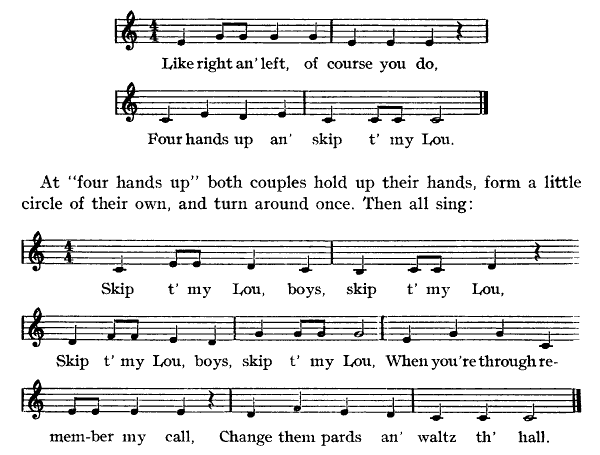
As these words are sung the original pair lead another couple into the center, and the first boy and girl chosen resume their places in the circle. And so it goes until everybody has "waltzed the hall." Sometimes, just before the last verse is sung, everybody "goes right and left" or executes the "once and a half and a half all round" figure, familiar in the ordinary country dances.
3. THE MILLER BOY.
Gomme (Traditional Games, London, 1898, I, pp. 289-293) gives eight English versions of this song, and Wolford (Play-Party in Indiana, 1916, p. 67) prints one from Indiana, remarking that the tune was "harmonized by Beethoven for George Thomson in 1624" and published in D'Urfey's Pills to Purge Melancholy, I, p. 169. Newell (Games and Songs, 1903, p. 22), reports several versions, Van Doren (JAFL 32: 490), has a good one from rural Ohio, while Ames (JAFL 24: 306) and Hamilton (JAFL 27: 293) found it still popular at play-parties in Missouri. The words of the following variant are those which I noted down at playparties in Benton County, Arkansas; the melody is from the singing of Mr. Carl Durbin, Pineville, Mo.
In this game each boy takes his partner by her left hand, and they all form a double ring, with the girls on the outside. The odd man - the "Miller Boy" - stands alone in the center of the circle. The players march round and round, singing:
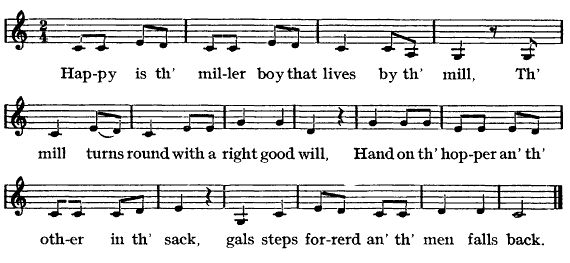
[Hap-py is th' mil-ler boy that lives by th' mill, Th'
mill turns round with a right good will, Hand on th' hop-per an' th'
oth-er in th' sack, gals steps for-rerd an' th' men falls back.]
As the ladies step forward the boys must get new partners - each man taking the girl directly behind him - and the "Miller Boy" attempts to snatch a girl for himself while the change is being made. If he succeeds, the man who loses his partner is the next "Miller Boy." A number of variations are sometimes introduced in order to make the "Miller Boy's" task more difficult. Sometimes they sing "men steps forrerd an' th' galsfalls back," or occasionally "all turn round an' walk right back."
4. WE'RE MARCHING DOWN TO OLD QUEBEC
Sandburg (American Songbag, 1927, p. 166) refers the last two verses of this song to "My Pretty Little Pink," which was popular in Kentucky in the late 1840's, and is decribed as "a knapsack and marching tune with Mexican War references." Newell (Games and Songs, 1903, p. 125) prints a Massachusetts version which he traces back to 18oo, and thinks may be of Revolutionary origin. Van Doren (JAFL 32: 491.) found this song in Eastern Illinois, and Kittredge (JAFL 20: 275.) reports an almost identical version from Kentucky. Hamilton (JAFL 24: 303) calls her Missouri variant "Old Quebec," and it is not very different from my Ozark song. See also Wolford (Play-Party in Indiana, 1916, p. 65), Mooney (JAFL 2. 104) and Wedgwood (JAFL 25: 27). The present version was contributed by Mr. and Mrs. Allen Woods, Pack, Missouri. This game is played very much like "The Miller Boy," but whenever the words "an' we'll turn back" are sung each couple does an about-face as quickly as possible. Two regularly appointed judges decide which couple is slowest in making the turn, and this couple is turned out of the circle. At the words "we'll open up th' ring" the circle is broken for a moment, and the boy and girl outside rush to get in before it can be closed against them.
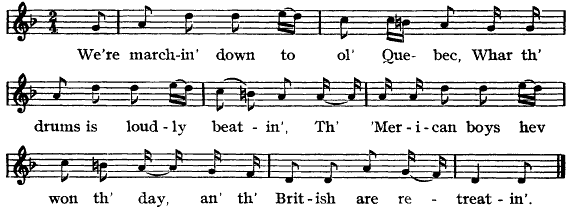
[We're march-in' down to ol' Que- bec, Whar th'
drums is loud - ly beat - in', Th' 'Mer - i - can boys hev
won th' day, an' th' Brit-ish are re - treat - in'.]
Th' war's all over an' we'll turn back
To th' place whar we first started,
We'll open up th' ring an' receive a couple in
To relieve th' broken-hearted.
My purty leetle pink, I used to think
I couldn't live well without you,
But I'll let you know before I go
Thet I don't keer much about you.
I'll put my knapsack on my back
My rifle on my shoulder,
An' I'll march away to New Orleans
An' jine a band o' soldiers.
5. WEEVILY WHEAT
Sandburg (American Songbag, 1927, p. 161) reports this as an early play-party song from Indiana, and says that the game was "somewhat like the Virginia Reel." Emma Bell Miles (Harper's Magazine, 109, 1904, p. 121) found the same dance-song used at play-parties in Tennessee and Kentucky, "It is not impossible," she writes, "that the Charlie of these songs is the Prince Charlie of the Jacobite ballads. 'Over the river, Charlie' may or may not be an echo of 'Over the waters to Charlie,' for a large proportion of the mountain people are descended from Scotch Highlanders who left their homes on account of the persecutions which harassed them during Prince Charlie's time, and began life anew in the wilderness of the Alleghanies." Mark Sullivan (Our Times, 1927, pp.158-159) gives texts from Indiana and North Carolina, and he also suggests that the song refers to "Bonnie Prince Charlie, of whom the Scots sang so much, and loved better than he deserved." Wolford (Play-Party in Indiana, 1916, pp. 102-106) prints many verses, and says that the game was frowned upon as being too much like dancing. Newell (Games and Songs, 1903, p. 171) describes a children's game called "Charlie Over the Water" which seems to be a degenerate version of "Weevily Wheat." Richardson (American Mountain Songs, 1927, p. 30) has a "Weevily Wheat" song from the Southern Appalachians. Blair (JAFL 40: 98--99) reports a Kentucky variant - she spells it "Weavily Wheat." For other texts see Hamilton (JAFL 27: 290), Piper (JAFL 28: 278), Hofer (Children's Singing Games, 1901, p. 38) and Van Doren (JAFL 32: 488). The following stanzas were supplied by Mrs. Carrie Baber, Pineville, Missouri, and the melody by Mrs. Mary Grant, Anderson, Missouri.
The players form in two parallel rows, with the girls on one side and the boys on the other. The boy and girl at the opposite ends of their respective lines swagger out to the center and swing, then return to their places, to be followed by the next couple. When all have swung, the whole party parades about, swinging at intervals, after which the original lines are re-formed and the whole performance repeated. Sometimes a sort of Virginia Reel figure is introduced into the game.
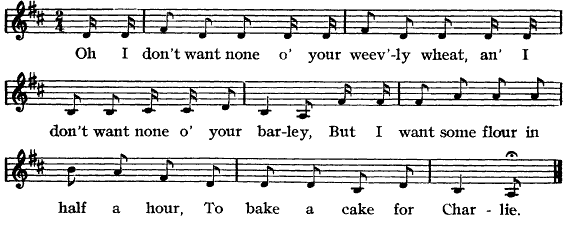
[Oh I don't want none o' your weev'-ly wheat, an' I
don't want none o' your bar-ley, But I want some flour in
half a hour, To bake a cake for Char - lie.]
Oh Charlie he's a fine young man,
Oh Charlie he's a dandy,
Charlie likes t' kiss th' gals
An' he kin do it handy.
Th' higher up th' cherry tree
Th' sweeter grows th' cherry,
Th' more you hug and kiss a gal
Th' more she wants t' marry.
Yes, Charlie he's a fine young man,
Oh Charlie he's a dandy,
An' Charlie is th' very lad
Thet stole th' striped candy.
Over th' river t' feed them sheep
On buckwheat cakes an' barley,
We don't keer whut th' ol' folks says ---
Over th' river t' Charlie!
6. OLD DAN TUCKER
Pound (Poetic Origins and the Ballad, 1921, p. 219) tells us that "Old Dan Tucker" was written by Dan D. Emmett, the early blackface minstrel who became famous as the author of "Dixie." White (American Negro Folk-Songs, 1928, pp. 446--447) gives ten stanzas of Emmett's song and points out (p. 8) that it was used in minstrel shows and vaudeville as early as 1841. A song called "Get Out of the Way, Old Johnny Tucker" was published in 1850 (Negro Minstrel's Song Book, 1850, p. 318) and has much in common with the "Old Dan Tucker" series. Mark Sullivan (Our Times, 1927, p. 165) in describing the "Old Dan Tucker" game, says that the manner in which "Old Dan" gets a partner was the precursor of the modern practice of "cutting in." Hofer (Popular Folk Games, 1907, p. 58) mentions this game as "an old American barn-dance" and remarks that "the common way of playing this is at present being revived in the ballrooms." Wolford (Play-Party in Indiana, 1916, p. 78) prints a textfrom Indiana, Ames (JAFL 24: 309) has a good Missouri variant, Heck (JAFL 40: 23) reports a stanza sung by school-children in Ohio, Blair (JAFL 40: 96-97) has an "Old Dan Tucker" song from the Kentucky mountains, and Van Doren (JAFL 32: 488-489) sets down a text from rural Illinois. See also Wedgwood (JAFL 25: 272), Perrow (JAFL27: 131), Piper (JAFL 28: 284) and Gardner (JAFL 33: 116-117). The version presented below is that sung by Mr. Carl Durbin and Mrs. Carrie Baber, Pineville, Missouri. In this game all the players choose partners and form a big circle, holding hands. An odd boy is called "Old Dan," and he stands alone in the center. Everybody sings lustily:
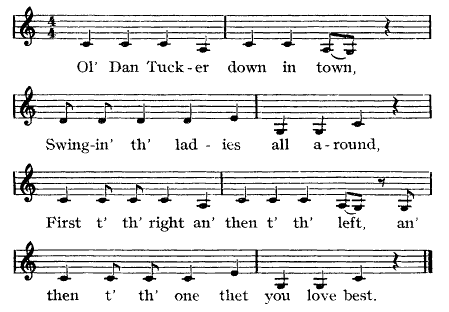
[Ol' Dan Tuck - er down in town,
Swing-in' th' lad - ies all a - round,
First t' th' right an' then t' th' left, an'
then t' th' one thet you love best.]
At the words "first to the right" it is "Old Dan's" privilege to pull a girl out into the ring by her right hand, turn her around once, and thrust her back into her place again. When they sing "then to the left," he takes another girl out by the left hand, and swings her as before. At the words "then to the one that you love best," every boy swings his partner. It as at this moment that "Old Dan" tries desperately to grab a girl for himself, and if he succeeds the man who has lost his partner must be the next "Old Dan." The following stanza is a sort of chorus, used to keep "Old Dan" in the ring as long as possible, since he has no opportunity to get a partner while it is being sung:
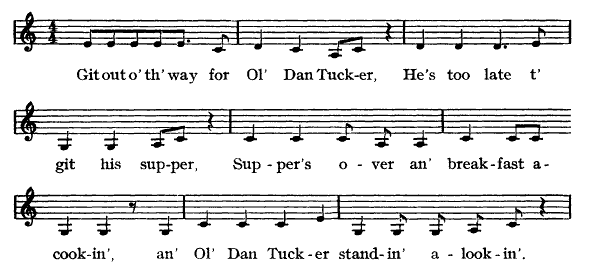
[Git out o' th' way for Ol' Dan Tuck-er, He's too late t'
git his sup-per, Sup - per's o - ver an' break-fast a-
cook-in', an' Ol' Dan Tuck -er stand- in' a - look- in'.]
If "Old Dan" really wishes he can use one girl for all three movements of the game, and thus be sure of getting himself a partner, but this is not considered the sporting thing, and he does not do it often - usually not unless he loses his temper. Several other verses are used as fillers in this game:
Ol' Dan Tucker is a fine ol' man,
Washed his face in a fryin' pan,
Combed his head with a wagon wheel,
An' died with a toothache in his heel.
Ol' Dan Tucker down in town,
A-ridin' a goat an' a-leadin' a hound,
Th' hound give a howl an' th' goat give a jump,
An' throwed Ol' Dan a-straddle of a stump.
Ol' Dan Tucker he got drunk,
Fell in th' fire an' kicked out a chunk,
Fire coal got in Dan's ol' shoe,
Oh my golly how th' ashes flew.
7. PIG IN THE PARLOR
There are many references to this game in the literature. Wolford (Play-Party in Indiana, 1916, p. 81) records three verses and a long refrain; Ames (JAFL 24: 298) and Piper (JAFL 28: 283--284) print similar variants. Heck (JAFL 40: 22) reports a stanza of this song from a ring-game played by children in Cincinnati, Ohio. See also Gardner (JAFL 33: 117 -118). The words and music which follow present the song as I heard it near Sulphur Springs, Arkansas. This play begins exactly like "Old Dan Tucker," except that the odd man in the center is called the "Pig." All sing:

[My paw an' maw was I - rish, My paw an' maw was
I - rish, My paw an' maw was I - rish, And I am I- rish too.]
Your right hand to your pardner,
Your left hand to your neighbor,
Your right hand to your pardner,
An' we'll all promenade.
As the ring is first formed, every boy has his partner at his right. At the words "your right hand to your pardner," he releases her left hand and takes her right. When they sing "your left hand to your neighbor," he drops his partner's hand, steps over to the next girl, takes her left hand and makes one turn around her - then rushes back to grasp his partner's right as the words "your right hand to your neighbor" are heard for the second time. Then each boy takes his girl's left hand again, and all promenade - march around in a circle. The "Pig" usually manages to snatch a partner for himself while these complicated changes are being made, and the man who finds himself without a partner must be the next "Pig." When this occurs the game goes on exactly as before, except that the verse is changed to:
We got a new pig in th' parlor,
We got a new pig in th' parlor,
We got a new pig in th' parlor,
An' he is Irish too.
Several other verses, not set to any definite tune, are sometimes shouted out at unexpected moments in order to distract and confuse the "Pig." One of these runs about as follows:
Pig in th' pen an' a three rail high,
Bullet in th' gun an' th' pig must die.
8. SHOOT THE BUFFALO
Wolford (Play-Party in Indiana, 1916, pp. 29--30) gives three good texts of this song, but no melody. For other references see Ames (JAFL 24 :301), Hamilton (JAFL 27:33) and Perrow (JAFL 26: 137). The following text and melody were obtained from Mrs. W. E. Jones, Pineville, Missouri. In this simple game the couples all form a ring and dance about the room, singing at the top of their voices. When they come to the third line in each verse they change partners, and then promenade back to their original places in the circle. At some parties the first stanza is used as a refrain, being repeated before each of the succeeding verses.

[We'll shoot th' buf - fa - lo, Yes, we'll shoot th' buf - fa -lo,
We'll ral - lythrough th' cane-brakes, an' shoot th' buf - fa - lo.]
Rise ye up, my dearest dear,
Present me to your paw,
An' we'll all march together
To th' state of Arkansaw.
Whar th' hawk shot th' buzzard
An' th' turkey stumped his toe,
We'll rally through th' cane-brakes
An' shoot th' buffalo.
I had a ol' saddle.
An' I hung it in th' loft,
Along come a cowboy
An' cut th' pockets off.
Yes, he cut th' pockets off,
He cut th' pockets off,
Along come a cowboy
An' cut th' pockets off.
Th' buffalo is dead,
Cause we shot him in th' head,
We'll rally through th' cane-brakes
An' shoot th' buffalo.
9. FOUR IN THE MIDDLE
Wolford (Play-Party in Indiana, 1916, p. 33) reports a longer and different version from Indiana, under the title "Coffee Grows in a White Oak Tree," and several lines relating to "Susie Brown" are found in her "Cuckoo Waltz" game-song (p. 36), which is also recorded by Sandburg (American Songbag, 1927, p. 160). See also Sandburg's song "My Pretty Little Pink," which he says was sung in Kentucky in the late 1840's (p. 166). The line "a great big house and nobody living in it" is given by Piper (JAFL 28: 267) as part of a play-party song called "Down in Alabama," and Perrow (JAFL 27: 187) records a stanza of a Virginia song called "Coffee Grows on White Oak Trees." The Ozark version which follows was taken down from the singing of Mr. Carl Durbin, Pineville, Missouri. Each man chooses a partner, and all the players form a large circle, holding hands, with one couple in the center. They all sing slowly:

Cof-fee grows on white oak trees, Riv-ers flow with bran-dy 0,
go choose some one t' roam with you, As sweet as 'lass-es can-dy 0.
The boy and girl in the center each choose another partner from the big circle, so that there are two couples in the center instead of one. Then everbody sings the old "Skip to my Lou" tune:
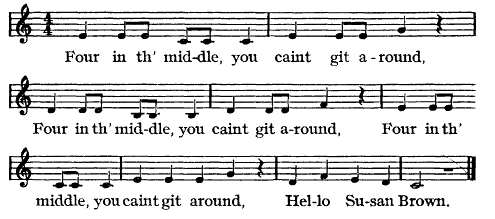
[Four in th' mid-die, you caint git a-round,
Four in th' mid-die, you caint git a-round, Four in th'
middle, you caint git around, Hel-lo Su-san Brown.]
All this time the dancers "right and left," and then proceed with several other verses:
Big white house an' nobody livin' in it,
Big white house an' nobody livin' in it,
Big white house an' nobody livin' in it,
Hello, Susan Brown.
Hump-backed nigger caint jump Josie,
Hump-backed nigger caint jump Josie,
Hump-backed nigger caint jump Josie,
Hello, Susan Brown.
Git out o' th' ring if you caint jump Josie,
Git out o' th' ring if you caint jump Josie,
Git out o' th' ring if you caint jump Josie,
Hello, Susan Brown.
As this last stanza is sung, the original couple dance out of the center and join the big circle again, leaving the second couple in the ring alone. The couple in the center then choose another boy and girl, and the game goes on as before.
10. JINGLE AT THE WINDOW
There are not many references to this song in the literature, but Wolford (Play-Party in Indiana, 1916, p. 96) prints an Indiana variant called "Tideo." Another of her songs (p. 39) has one line about "the jingle of the window," but the rest of it is very different from the Ozark game-song. Ames (JAFL 24: 311) has a Missouri variant called "Pass One Window Toddy-O." See also Hamilton (JAFL 27: 294). The words and music of the following version were obtained from Mr. Carl Durbin, Pineville, Missouri. In this game the players choose partners and form a double ring, with the girls in the inner circle, so that each boy is opposite his partner. Then the boys march around in single file, while the girls stand still, and everybody sings:
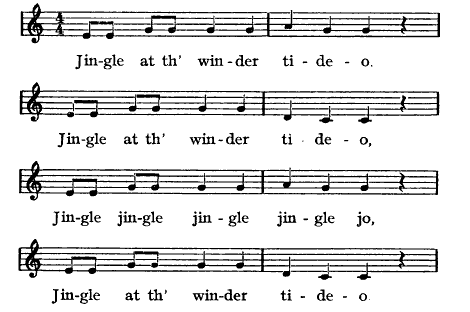
[Jin-gle at th' win - der ti - de - o.
Jin-gle at th' win- der ti - de - o,
Jin-gle jin-gle jin - gle jin - gle jo,
Jin-gle at th' win-der ti - de - o.]
When the complete circle has been made, each boy returns to his partner and swings her around once, after which they begin another march, singing:

[Pass one win-der ti - de - o, Pass one win-der ti - de - o,
Jin-gle jin-gle jin- gle jo, Jin-gle at th' win-der ti - de - o.]
But this time the boy passes his own partner and swings the next girl, and so on until every boy has swung every girl in the party. The words of the song are changed with each repetition- "pass two windows," "pass three windows" and so on. When every boy has swung every girl the game begins again as before, except that this time the boys make up the inner circle, while the girls march around in single file.
11. WE'LL ALL GO TO BOSTON
Kittredge (JAFL 20 : 275) has a Kentucky game-song beginning "Goodbye, girls, I'm going to Boston," and several similar lines occur in the "Go to Boston" song given by Wolford (Play-Party in Indi2na, 1916, p. 49). The following variant was contributed by Mr. Carl Durbin, Pineville, Missouri. In this game the players form two parallel lines, with the girls in one row and the boys in the other. The couple at one end march forward between the lines, and then walk backward to their places agzin, while everybody sings the following verse, using the name of the girl who is marching:
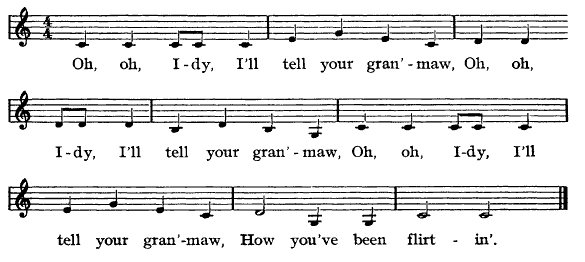
[Oh, oh, I - dy, I'll tell your gran' - maw, Oh, oh,
I-dy, I'll tell your gran'- maw, Oh, oh, I-dy, I'll
tell your gran'-maw, How you've been flirt - in'.]
Then the same couple march forward again, but this time the boy stops at the head of the boys' line, while the girl leads all the girls in marching around the whole group of boys, all singing:
Come along, gals, let's go t' Boston,
Come along, gals, let's go t' Boston,
Come along, gals, let's go t' Boston,
T' see thet couple married.
When the girls have returned to their places, the first boy leads all the others in marching around the girls' line, singing:
Saddle up, boys, an' let's go with 'em,
Saddle up, boys, an' let's go with 'em,
Saddle up, boys, an' let's go with 'em,
T' see thet couple married.
Then the next couple march down from the head of the lines and go through the same performance, and so on until everybody has "been to Boston." In some cases each verse is sung twice in succession, or even three times, in order to give plenty of time for the marching.
12. OLD BRASS WAGON
Sandburg (American Songbag, 1927, p. 159) has six verses of a similar song, which he says was popular with pioneers in Indiana, Missouri and Iowa. Blair (JAFL 40: 97) tells us that the Kentucky mountaineers sing "The Old Brass Wagon" to the tune of "Liza Jane," adding that "the intricate crossing in the dance resembles the spokes of a wagon wheel, hence the name." Hamilton (JAFL 27: 298, 302) prints many stanzas from northeast Missouri. See also Wolford (Play-Party in Indiana, 1916, p. 76), Piper (JAFL 28: 282) and Ames (JAFL 24: 307). The following version is the one most popular near Southwest City, Missouri; Mr. Allen Woods, Pack, Missouri, supplied the melody, which is very similar to that used in the "We'll All Go to Boston" game.
The boys form in one line, and the girls in another. The first couple walk hand in hand down the lines, then swing at the words "you are the one, my darling." With the next verse they separate, and the boy goes to the other end of the line and swings the girl at that end, while the girl is swinging a boy at the opposite end of the boys' line. Next comes a sort of "Virginia Reel" figure, then the original couple return to their places. The next couple now walk down the line, and so on until all have swung.


[We'll all run a - way with th' ol' brass wag - on, We'll
all run a - way with th' ol' brass wagon, We'll all run a-
way with th' ol' brass wag-on, You are th' one, my dar - lin'.]
One wheel off an' t'other one a-draggin',
One wheel off an' t'other one a-draggin',
One wheel off an' t'other one a-draggin',
You are th' one, my darlin'.
13. WE'LL ALL GO DOWN TO ROWSER'S
G. M. Miller (University Studies, University of Cincinnati, I, p. 31) mentions a game called "We're Marching Down to Rauser's," adding that "Rauser was evidently a German saloon-keeper who kept good beer." Wolford (Play-Party in Indiana, 1916, pp. 22-23) gives the words and music of an Indiana version, but says that it was not considered a proper game for church members - too much like dancing. Hamilton (JAFL 27 : 290) prints a very similar song from Missouri. Pound (American Ballads and Songs, 1922, No. II9) found a version which contains two stanzas of "Pig in the Parlor," and is described as "a game-song from Iowa." Van Doren (JAFL 32 :492) calls his Illinois variant "Going Down to Rowsie's," but it is not very different from Wolford's song. See also Ames (JAFL 24 : 298) and Gardner (JAFL 33 : 122). I am indebted to Mr. Clyde Sharp and his friends at Noel, Missouri, for the following text. The tune is the same one used in the "Pig in the Parlor" game.
This game is played very much like "Old Brass Wagon," but at the words "good lager beer" each boy and girl bow very low in an exaggerated, clownish fashion, and cut a similar caper at "corn whiskey clear." The girl often grasps her skirt at either side and spreads it out sidewise as she makes this bow.
We'll all go down to Rowser's,
We'll all go down to Rowser's,
We'll all go down to Rowser's,
For there they have the beer.
Good lager beer, good lager beer,
Corn whiskey clear, corn whiskey clear,
We won't go home till mornin',
An' then we won't go home.
We'll dance all night,
Till broad daylight,
We won't go home till mornin',
An' then we won't go home.
We won't go home till mornin',
We won't go home till mornin',
We won't go home till mornin',
We won't go home at all.
14. MOLLY BROOKS
Wolford (Play-Party in Indiana, 1916, p. 71) found a similar game popular in Indiana, but it does not seem to have been well known in other parts of the country. The version here recorded is from the singing of Mr. Allen Woods, Pack, Missouri. In playing "Molly Brooks" the dancers form in two parallel lines, the girls on one side and the boys on the other. The boy and girl at one end swing first, then swing with the couple next them in line, and so on until every girl has been swung by the first boy, and every boy has swung the first girl. Sometimes those whom the leaders have passed continue to swing right and left, so that the whole room is full of whirling dancers before the first couple reach the end of the line.
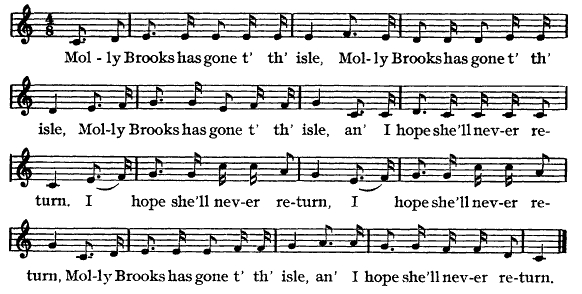
[Mol- ly Brookshasgone t' th' isle, Mol-lyBrookshas gone t' th'
isle, Mol-ly Brooks has gone t' th' isle, an' I hope she'llnev-er return.
I hope she'll nev-er re-turn, I hope she'll nev-er return,
Mol-ly Brooks has gone t' th' isle, an' I hope she'll nev-er re-turn.]
15. IN EIGHTEEN HUNDRED AND SIXTY
Ames (JAFL 24: 314) reports a similar text from Boone County, Missouri, but her melody is very different from the one used in the Ozarks. I have found no other mention of this game in the play-party literature. I have heard several slightly different versions; the one which follows was sung for me by Mr. Allen Woods, Pack, Missouri, and by Dr. A. H. Pootford, who heard the song at Fayetteville, Arkansas. The song is known to many of the old settlers, but it appears that the game has not been played in this locality for many years, and the figures of the dance have been forgotten.
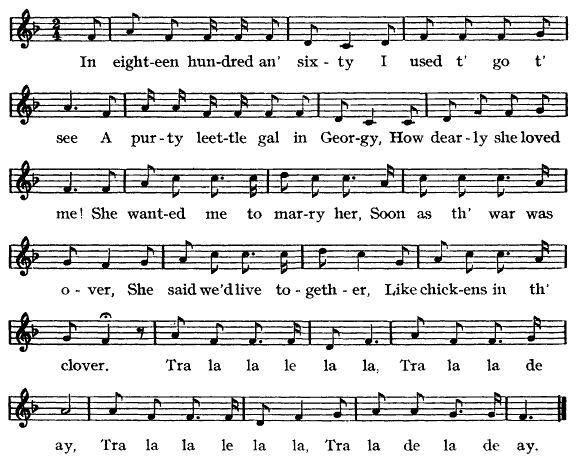
[In eight-een hun-dred an' six - ty I used t' go t'
see A pur - ty leet-tle gal in Geor-gy, How dear - ly she loved
me! She want-ed me to mar-ry her, Soon as th' war was
o - ver, She saidwe'dlive to - geth - er, Like chick-ens in th'
clover. Tra la la le la la. Tra la la de
ay, Tra la la le la la, Tra la de la de ay.]
prints a play-song containing the following lines:
Bring through yo' Sugar-lo'-tea,
Bring through yo' Candy,
All I wants is to wheel an' tu'n,
An' bow to my Love so handy.
Talley explains further (p. 84) that "Sugar-lo'-tea and Candy are nicknames applied in imagination to the women engaged in playing the Play Song."
As in "We'll All Go to Boston" and similar games, the players form in two parallel lines, with the boys in one line and the girls in the other, so that each boy stands opposite his partner. Then the boy at the extreme right leads his girl down the aisle, while everybody sings:

[Lead her up t' sug-ar an' tea, Lead her up t' can - dy,
you swing round thetsug-ar an' tea, While Iswinground thet dan-dy.]
With this he brings her back to the starting point, and swings her around as they all sing:
Hi oh thet sugar an' tea,
Hi oh thet candy,
You swing round thet sugar an' tea,
While I swing round thet dandy.
Then the boy struts down the aisle alone, and swings the last girl on the other end of the line, while his partner dances with the fellow nearest her in the row of boys, all singing lustily the while. After this the first
boy returns to his partner, and they swing as before. Then the boy takes the next girl, and the girl the next boy, and so on until everybody has participated in the swinging. The first couple then retire to the foot of the lines, and the next couple go through the same performance.
17. GREEN GRAVEL
"Green Gravel" is an old Irish song, and I have been told that the first stanza is connected with the Irish Catholics' hatred of the Masonic fraternity. The Ozark natives know nothing of this, however, and do not
connect "free meshin" with "freemason" at all. Newell (Games and Songs, pp. 71 and 242) gives several similar songs, and points out that "freemasons" is sometimes changed to "free maidens," while "ashamed" becomes "arrayed." Perrow (JAFL 26: 139) records two stanzas from Mississippi, in which it is the "fern nations" which are "ashamed to be seen." Gardner (JAFL 33: 100) gives two versions of a "Green Gravel" song from Michigan, and Heck (JAFL 40: 15) found the game played by school-children in Ohio. The words of the following variant were communicated by Dr. A. H. Pootford, formerly of Fayetteville, Arkansas, and the melody was set down for me by Miss Van Higgins, Pittsburg, Kansas. In this game the players all hold hands and dance around in a circle while they sing:
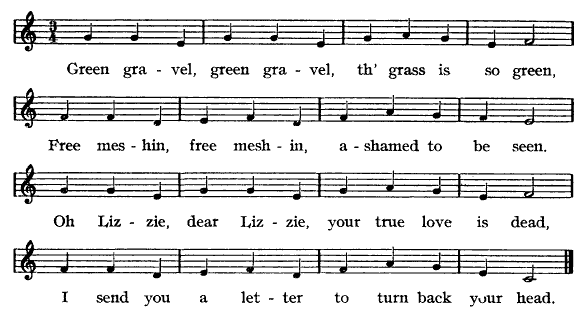
[Green gra - vel, green gra - vel, th' grass is so green,
Free mes - hin, free mesh - in, a - shamed to be seen.
Oh Liz - zie, dear Liz - zie, your true love is dead,
I send you a let - ter to turn back your head.]
When the last line is sung, Lizzie turns about and walks backward. Then the verse is repeated with another name instead of Lizzie, and so on until all the players are dancing backward.
18. OLD JOE CLARK
There are many references to the "Old Joe Clark" songs in the playparty literature, usually under the title "Liza Jane." Blair (JAFL 40: 97--98) prints a good Kentucky variant. White (American Negro Folk-Songs, 1928, pp. 28 and 337) has several Negro versions from North Carolina, and Sandburg (American Songbag, 1927, pp. 132 and 308) offers two good Southern Appalachian texts. Cox (Folk-Songs of the South, 1925, p. 495) records an "Old Joe Clog" song from West Virginia, and there is at least one good text set down by Payne (Publications of the Folk-Lore Society of Texas, I, p. 33). There are phonograph records, too, (Columbia 15Io8--D; Victor No. 20302) but they hardly do justice to the song. Edmands (JAFL 6: 131) reports eight stanzas from the North Carolina mountains. For further references see Halliwell (Nursery Rhymes, 1842, p. 135), Perrow (JAFL 25: 152; 28: 176) and Scarborough (On the Trail of Negro Folk-Songs, 1925, pp. 8, 169, 192, 227).
Although the old-time dancers are unanimous in contending that "Old Joe Clark" is a regular party-game, played with "figures" as fixed and definite as "Weevily Wheat" or "Old Dan Tucker," my own observations do not support this contention. The game as I have seen it played is a wild medley of elements from other games, and the fact that the same tune is played by fiddlers at the "square" dances still further complicates
matters. Occasionally some gifted player, with a shrill whoop to attract attention to himself, breaks into a sort of jig or breakdown, while the chorus is sung loudly by the other dancers who gather about him. And I
have attended two parties in which all figures were dispensed with, and the players simply "paired off" and danced about in couples - a crude imitation of the modern "round" dances introduced by the tourists,
except that there was no music save the singing of the players. The following verses were written down for me by Mrs. Emma Chambliss, who heard them sung by an old woman in McDonald County, Missouri.
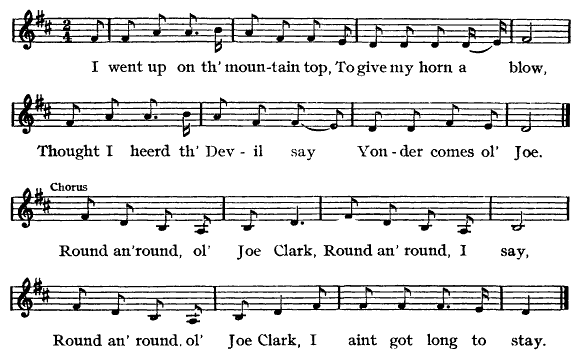
[I went up on th' moun-tain top, To give my horn a blow,
Thought I heerd th' Dev - il say Youn -der comes ol' Joe.
Chorus: Round an'round, ol' Joe Clark, Round an' round, I say,
Round an' round, ol' Joe Clark, I aint got long to stay.]
I went up on th' mountain top
A-huntin' sugar cane,
Stuck my foot in a holler log
An' out jumped Liza Jane.
I went down t' ol' Joe Clark's,
Went right in th' door,
He slep' on th' ol' feather bed,
An' I slep' on th' floor.
I tuck her down t' ol' Joe Clark's,
Didn't know whar t' put her,
She hung her hat on th' table leg
An' stuck her foot in th' butter.
This is the version favored by Mr. Clyde Sharpe, Noel, Missouri:
Ol' Joe Clark's a preacher,
He preached all over th' plains,
Th' highest text he ever tuck
Was high, low, jack an' th' game.
Chorus: Ti ral de dal de dal de,
Ti ral de dal de ay,
Ti ral de dal de dal de,
Ti ral de dal de ay.
Ol' Joe Clark he hed a dawg,
As blind as he could be,
But ever' time he treed a coon
He swore thet dawg could see.
Ol' Joe Clark he hed a wife,
He set her on a shelf,
I tuck her down an' kissed her twice
An' I clum up thar myself.
She throwed her arms around my neck,
She kissed me twice an' cried,
She said I was th' sweetest thing
Thet ever lived or died.
If I had a needle an' thread
As fine as I could sew,
I'd sew her on to my shirt-tail
An' dawn th' river we'd go.
Mrs. Mary Grant, Anderson Missouri, adds the following stanzas to the "Old Joe Clark" song:
I went up on th' mountain top
An' give my horn a blow,
An' ever' gal in New Orleans
Says: Yonder comes my beau.
I went down t' ol' Joe Clark's,
Th' house was all alone,
An' so I et th' meat all up
An' left ol' Joe th' bone.
I went down t' Shoo-fly's,
An' Shoo-fly wasn't in,
I set down on th' red-hot stove,
An' I got right up agin.
I went up th' new cut road,
An' she come down th' lane,
I throwed my hat in th' corner fence,
An' scared out Liza Jane.
19. THE BROWN JUG
I have not been able to find any reference to this particular song in the play-party literature. Gardner (JAFL 33: 109--110) gives the ordinary "Little Brown Jug" as a game-song, but has no information as to how the
game was played. It may be somehow connected with the "Bounce Around" song reported by Ames (JAFL 24: 296). I have heard several slightly different versions in the Ozarks; the one which follows is that sung by Mr. Allen Woods, Pack, Missouri. The melody is similar to one of the familiar "Skip to My Lou" tunes. The "Brown Jug" is no longer popular in this vicinity, and I have never seen it played, or been able to find anybody who could give me a description of the game.

[I sent my brown jug down t' town, I sent my brown jug
down t' town, I sent mybrown jug down t' town, Tral de al de ay!]
Hit come back all flounced around,
Hit come back all flounced around,
Hit come back all flounced around,
Tral de al de ay.
20. ACROSS THE HALL
This simple game is very popular in certain parts of the Ozark country, and is known to very many people, but I have never been able to find any reference to it in the literature of the subject. The song has only one
verse, which I have recorded from the singing of Mr. Allen Woods, Pack, Missouri.
The game begins with the players standing so as to form a single large circle, with each boy on his partner's right. At the first words of the song each boy crosses to a girl on the opposite side, and swings her about as
indicated. At the end of the verse the boys return to their original partners, and promenade to the left, chanting something that sounds like "la-de-da-de-da-da."
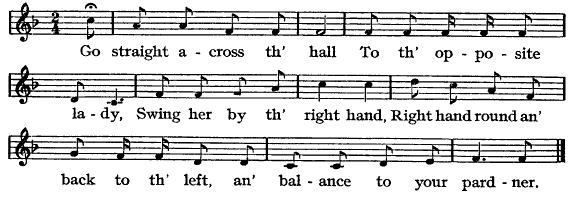
[Go straight a - cross th' hall To th' op - po - site
la - dy, Swing her by th' right hand, Right hand round an'
back to th' left, an' bal - ance to your pard - ner.]
21. ROXIE ANN
Carl Van Doren (JAFL 32: 492) has a text of "Roxie Ann" from eastern Illinois, but he did not record the melody, and has no description of how the game was played. "It was sung by settlers from Kentucky,"
he writes, "and may possibly be of Negro origin." The present version was contributed by Mr. Jay L. B. Taylor and Mrs. Marie Wilbur, both of Pineville, Missouri. Mrs. Wilbur recognized this verse as part of a game she had played some thirty years before, but could not recall any more of the song, or remember how the game was played.

[Rox-ie Ann's a fool - in' gal, She fools me all th' while,
She'sbeena long time fool-in', fool-in', She'sbeen a long time fool-in' me.]
I'm goin' t' tell my Maw on you,
I'm goin' t' tell my Paw,
She's been a long time foolin', foolin',
She's been a long time foolin' me.
22. THE JUNIPER TREE
Wolford (Play-Party in Indiana, 1916, p. 8o) records a similar song under the title "Old Sister Phoebe," and says that it was played in Indiana about 1891. Parker (JAFL 20: 248) mentions it as a game played by North Carolina mountaineers. Piper (JAFL 28: 268) gives six verses of a "Juniper Tree" song from Nebraska. Van Doren (JAFL 32: 489) reports a similar song from eastern Illinois, and describes the dance as a sort of kissing game played with a hat. See also Hamilton (JAFL 27: 300), Newell (Games and Songs, 1903, p. 57) and Gardner (JAFL 33: 107). Also Wedgwood (JAFL 25: 272) and Shearin (Syllabus of Kentucky Folk-Songs, 1911, p. 37). The melody as given below is from Mrs. Marie Wilbur, Pineville, Missouri, and the text supplied by Mr.
William Lewis, Anderson, Missouri.
The "Juniper Tree" song is remembered by many people in the Ozark country, but the game is no longer played, and it is difficult to get much definite information about it. Mr. Lewis remembers only that it was a
ring game, with one person seated in the center of the circle. The players march around singing, and at the words "keep your hat on" somebody puts a hat on the head of the seated player, who then chooses another
person to take his place in the center.
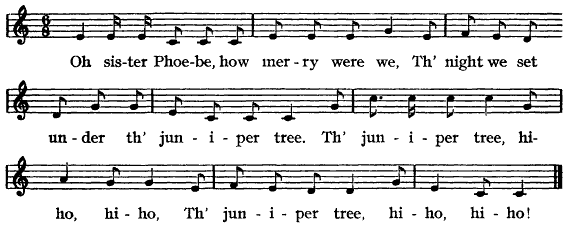
[Oh sis-ter Phoe-be, how mer - ry were we, Th' night we set
un-der th' jun - i - per tree. Th' jun - i - per tree, hiho,
hi- ho, Th' jun - i - per tree, hi - ho, hi - ho!]
So keep your hat on, it will keep your head warm,
An' take a sweet kiss, it won't do you no harm,
Hit will do you much good I am shore, I am shore,
Hit will do you much good I am shore.
I have one sonny an' he is my own,
He's allus complainin' of stayin' at home,
So rise you up sonny, go git you a wife,
So rise you up sonny an' go.
23. MY PAPPY HE WILL SCOLD ME
Ames (JAFL 24: 298) includes two similar verses in her "We'll All Go Down to Rowser" song, but many Ozarkers tell me that these stanzas belong to a very much older game, the tune of which seems to have been forgotten. The words below were furnished by Mr. Jay L. B. Taylor, Pineville, Missouri. Taylor said that he knew it very well some thirty years ago, but cannot now recall how the game was played.
My Pappy he will scold me, scold me, scold me,
My Pappy he will scold me, for stayin' out all night.
My Mammy she'll uphold me, uphold me, uphold me,
My Mammy she'll uphold me, an' say I done jest right.
24. KING WILLIAM WAS KING JAMES' SON
Newell (Games and Songs, 1903, pp. 73--75 and 247) gives several versions of this song, some of which are used in a singular game played with hats, and refers to a "kissing round" played in the Middle West and
South. He traces some connection between this song and the old Swedish ballads of Folke Algotson, who lived in the thirteenth century. See also a comment (JAFL i6: 298) where it is said that the game is of English
origin and represents recruiting in war time. Spinney (JAFL 34: 111) gives a North Carolina version called "King William Was King George's Son." Gardner (JAFL 33: I07 -108) has three good Michigan texts. See also Van Doren (JAFL 32: 493), Belden (Song-Ballads and Other Popular Poetry, 1910, No. 143), Hamilton (JAFL 27: 295) and Ames (JAFL 24: 313). The following verses were sung for me by Mrs. Carrie Baber, Pineville, Missouri, but the melody here set down is that furnished by Miss Wilma Wilhoit, Anderson, Missouri.
This is another ring game, in which all the couples join hands and form a big circle, with one odd boy in the center. Those in the circle dance about as the first stanza is sung, but halt to sing the second, while the boy
in the middle walks around scrutinizing each girl in turn. At the beginning of the third stanza he kneels before one of the girls, bows his head and kisses her hand. This done, he rises and steps into the line beside her, and the man whose place he takes must go into the center and be the next one to represent King William.
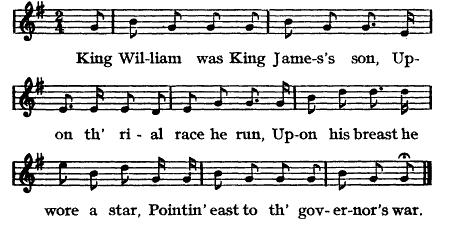
[King Wil-liam was King Jame-s's son, Upon
th' ri - al race he run, Up-on his breast he
wore a star, Pointin' east to th' gov- er-nor's war.]
Go choose to th' East, go choose to th' West,
Choose th' gal thet you love best,
If she aint hyar to take your part,
Choose another with all your heart.
Down on this carpet you must kneel.
Shore as th' grass grows in th' fiel',
Salute your bride an' kiss her sweet,
An' then you may rise upon your feet.
25. SALLY GOODIN
This song was popular at the Ozark play-parties of thirty-five years ago, but nobody seems to remember much about how the game was played, beyond the fact that it began with each two couples forming a
ring - the "eight hands up an' round we go" of the ordinary country dances. Mrs. Carrie Baber, Pineville, Missouri, furnished the accompanying text, and the melody was supplied by Mr. William Lewis, Anderson, Missouri. Mr. C. O. Pingry, Pittsburg, Kansas, tells me that he heard a similar song in West-Central Missouri about thirty years ago.

[I had a piece o' pie, An' I had a piece o' pud-din', I
give it all a - way To see Sal - ly Good- in.]
Swing Sally Goodin,
Swing Gran'maw,
Ever'body rag
T' please Gran'paw.
I looked down th' road,
Seed somthin' runnin',
An' I thought t' my soul
Thet I seed Sally comin'.
Swing Sally Goodin,
An' then t' your taw*
An' then t' th' gal
From Arkansaw.
I love my pie,
I love my puddin',
I love thet gal
They call Sally Goodin.
*The word taw, according to Mrs.Baber, signifies a man's original partner in the game.
26. THE NEEDLE'S EYE
Walford (Play-Party in Indiana, 1916, p. 72) reports this song from Indiana, and remarks that the words are very different from those of the original English game. For other American texts see Hofer (Children's Singing Games, 19o0, p. 17), Hamilton (JAFL 27: 298), Piper (JAFL 28: 263), Newell (Games and Songs, 1903, pp. 91 and 241) and Gardner (JAFL 33: 115). The following stanzas were supplied by Mr. Allen Woods, Pack, Missouri, and the melody by Miss Wilma Wilhoit, Anderson, Missouri.
In playing this game one boy and girl stand still with clasped hands held high, so as to form an arch. The other players hold hands and dance through the arch in single file, and at the words "Because I wanted you,"
the couple forming the arch drop their arms so as to catch one of the dancers. When a girl is caught she takes her position behind the girl in the arch, while the boys fall in behind the boy. Each of these players
clasps the person in front around the waist, and all pull together to break the arch. When the arch is broken the two arch-makers join the line of dancers, and a new arch is formed by the boy and girl next in line.

[The need-le's eye that doth supplyThethread thatrunsso true, Oh
man - y a beau have I let go, Be - cause I want-ed you.]
I don't want him, I don't want her,
The thread that tells us true,
Oh many a lass have I let pass
Because I wanted you.
27. RAZ-MA-TAZ-A-MA-TEE
This is the Ozark version of a very old game-song, which Wolford (Play-Party in Indiana, 1916, pp. 52-53) calls "Here Come Four Dukes A-Riding" - common in many parts of the United States. Newell (Games and Songs, 1903, pp. 46-47) traces it back to "Three Kings," which is a "rude and remarkable variety" of the still older "Knights of Spain," still played in many European countries. Gomme (Traditional Games, 1894, II, pp. 233-253) lists thirty British versions, and regards the game as "a distinct survival or remembrance of the tribal marriage," contending that the last line of each verse represents "an old tribal war 'cry." The game was formerly popular at the Ozark play-parties, but has now degenerated into a school-children's play. Mrs. Marie Wilbur, Pineville, Missouri, recalls the following stanzas.
The players form in two parallel lines, boys in one row and girls in the other, about ten paces apart. The boy on the left advances with a peculiar skipping step, singing loudly:

[Hyar comes a duke a - rid - in', a -rid- in', a - rid - in', Hyar
comes a duke a - rid - in', Th' raz - ma - taz - a-ma-tee.]
Then the boy returns to his place, and all the girls dance toward the boys' line as they sing:
Whut are you ridin' hyar for,
Hyar for, hyar for,
Whut are you ridin' hyar for,
Th' raz-ma-taz-a-ma-tee.
Upon this the girls return to their former position, and the next boy skips forward and sings:
I'm ridin' hyar t' git married,
Married, married,
I'm ridin' hyar t' git married,
Th' raz-ma-taz-a-ma-tee.
As this second boy steps back into line the girls all follow him, singing:
Choose one of us, sir,
Of us, sir, of us, sir,
Choose one of us, sir,
Th' raz-ma-taz-a-ma-tee.
And the next boy in line makes answer:
You're all too ole an' ugly for me,
Too ugly for me, too ugly for me,
You're all too ole an' ugly for me,
Th' raz-ma-taz-a-ma-tee.
As the girls skip forward this time they sing in a spirited fashion:
We're jes' as good as you are,
You are, you are,
We're jes' as good as you are,
Th' raz-ma-taz-a-ma-tee.
Then the next boy advances and chooses one of the girls, and kneels before her as he sings:
You're th' fairest one I see,
One I see, one I see,
You're th' fairest one I see,
Th' raz-ma-taz-a-ma-tee.
And with this he leads her back with him to the boys' line, and the next boy becomes the "duke," so that the whole rigamarole is repeated until all the girls have been chosen.
28. THE GIRL I LEFT BEHIND ME
Wolford (Play-Party in Indiana, I916, p. 46) found this game popular in Indiana, and Hamilton (JA FL 27: 297) reported a similar version from the northeast Missouri. Piper (JAFL 28: 286) prints a text from Nebraska in
which "If the tears don't fall and blind me" is substituted for the second line in the third stanza of my Ozark variant. Finger (Frontier Ballads, 1927, p. 63) has a western version in which this line runs "and the Indians
don't find me." Spaeth (Read 'Em and Weep, 1927, p. 16) says that the melody is an old Irish folk-tune, and was first written down in 1800.
It was at one time, according to Chapple (Heart Songs, Boston, 1909, p. 514) a popular marching tune in the British army. The versatile Dalhart has made an excellent phonographic record (Columbia, No. 437-D),
but the words are very different from those of the play-party song. The words and music as given below were contributed by Mr. Clyde E. Sharp, Noel, Missouri. I took part in this game myself, some years ago, but have forgotten the figures, and can remember only that it is somehow similar to "Across the Hall." Mr. William Lewis, Anderson, Missouri, says that "you just form a ring, change partners, and swing right and left. Then you balance to the next, and swing the girl behind you each time."
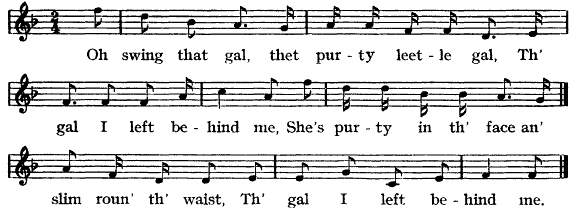
[Oh swing that gal, thet pur - ty leet - le gal, Th'
gal I left be - hind me, She's pur - ty in th' face an'
slim roun' th' waist, Th' gal I left be - hind me.]
Pardners t' th' right an' a right hand round,
An' pat her down eighteen ninety,
Then stop an' swing thet purty leetle gal,
Th' gal I left behind me.
If ever I see thet place agin,
An' a steer don't kick an' blind me,
I'll stop an' swing thet purty leetle gal,
Th' gal I left behind me.
29. CAPTAIN JINKS
This song is doubtless derived from a war-time ballad of the same name, which was well known in New England in the early seventies, according to Wolford (Play-Party in Indiana, 1916, p. 28). My grandfather heard "Captain Jinks" in Illinois shortly after the Civil War, but does not remember that it was used as a game-song. It was revived and featured in a musical comedy called "Captain Jinks," which played the Middle
West about 1902 or 1903, as I recall. G. M. Miller (University Studies, University of Cincinnati, I, p. 31) remarks that it is of comparatively recent origin - not nearly as old as "Weevily Wheat" or "Pop Goes the
Weasel." Piper (JAFL 28: 285), Ames (JAFL 24: 308) and Wolford (Play-Party in Indiana, 1916, p. 27) have all reported it from Middle Western play-parties. The song as given below was sung for me by Dr. A. H. Pootford, who learned it in Benton County, Arkansas.
The players all "ring up" to form one large circle, made up of alternate boys and girls, so that each girl stands at her partner's right. All girls step to the left as the first line is sung, and at the second line each stands still
while her partner dances around her. When the third line is sung everybody swings, and at the fourth they all promenade and resume their original positions in the circle.
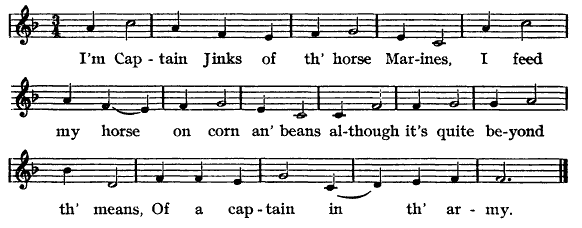
[I'm Cap - tain Jinks of th' horse Mar-ines, I feed
my horse on corn an' beans al-though it's quite be-yond
th' means, Of a cap-tain in th' ar - my.]
Well, Captain Jinks got drunk last night,
Hit's pass your lady to th' right,
An' swing her round with all your might,
For thet's th' style in th' army.
There are rumors of other and still older games in some sections of the Ozarks, but I have not been able to follow them up as I should have liked to do, or to find out anything very definite about them. It may be that
this paper will attract the attention of some student who has the time and the energy to go into the matter more thoroughly. In recent years, however, the younger hill-people have come to regard the party-games as
countrified and old-fashioned; many of them now go freely to the square dances, and some of the more progressive even favor the modern round dances introduced by the tourists and summer colonists. It is only in the more isolated and backward mountain settlements, where the current civilization has not yet penetrated, that the play-party is still in vogue, and even here the "frolics" are by no means as frequent or as popular as they were a decade ago. The play-party is passing, and another ten years, in my judgment, will see its total extinction in the Ozark country.